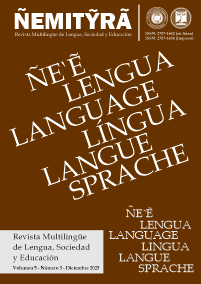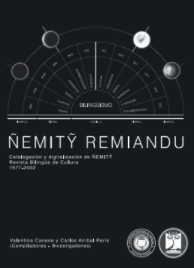Learning styles regarding gender and self-efficacy in English pre-service teachers
DOI:
https://doi.org/10.47133/NEMITYRA20232d12-3A11Palabras clave:
learning styles, self-efficacy, academic achievement, genreResumen
In learning, it is necessary to consider the different student learning styles of students because this action can promote motivation and interest in other subjects. The literature shows that, in several cases, teachers do not adjust teaching styles to learning styles, which can be a barrier to achieving student interest. Research shows that motivation and scaffolding language practice when caring for student learning styles impact academic achievement and self-efficacy. This research aimed to identify the relationship between learning styles, gender, and self-efficacy among English teachers in training; a quantitative descriptive method, correlational design, and transversal scope were followed. The participants of this study were 86 students enrolled in the Faculty of Languages in the Language Teaching class, 60.5% female and 39.5% male, with an average age of 21.7 years (SD = 4.9). The instruments used to obtain the participant data were the Honey-Alonso Learning Styles Questionnaire (HALSQ) and the Academic Volitional Strategies Inventory (AVSI). The results indicate that students are mainly theoretical and use self-efficacy strategies related to the future and the possible consequences they will face if they do not complete their tasks. Moreover, the statistical analysis demonstrates no relationship among learning styles, self-efficacy, and genre. Nevertheless, it is necessary to continue exploring LS, self-efficacy, and genre since they have been pointed out to influence language learning, reaching goals, and motivation in the learning and teaching areas.
Referencias
Al-Khaza’leh, B., & Mohammed, I.- edin A. (2020). Matching The Students’ Learning Preferences with Teacher’s Teaching Methods: The Case of International EFL Students In Malaysia. Journal of Education in Black Sea Region, 5(2), 42–50. https://doi.org/10.31578/jebs.v5i2.198
Alonso, M., Gallego, D. y Honey, P. (2007). Los Estilos de Aprendizaje: Procedimientos de diagnóstico y mejora. (7a. ed.). Bilboa España: Mensajero.
Balcı, Ö. (2017). The Effects of Learning-Style Based Activities on Students' Reading Comprehension Skills and Self-Efficacy Perceptions in English Foreign Language Classes. Higher Education Studies, 7(4), 35-54. https://eric.ed.gov/?id=EJ1161154
Bandura, A. (1986). Social foundations of thought and action: A social cognitive theory.Prentice-Hall, Inc.
Bandura, A. (1993). Perceived self-efficacy in cognitive development and functioning. Educational Psychologist, 28, pp. 117-148. Doi: 10.1207/s15326985ep2802_3
Biabani, M., & Izadpanah, S. (2019). The Study of Relationship between Kolb's Learning Styles, Gender and Learning American Slang by Iranian EFL Students. International Journal of Instruction, 12(2), 517-538.
Cabrera-Solano, P., Gonzalez-Torres, P., Castillo-Cuesta, L., & Jiménez, J. (2019). Perceptions on the Internal Factors Influencing EFL Learning: A Case of Ecuadorian Children. International Journal of Instruction, 12(4), 365-380. https://doi.org/10.29333/iji.2019.12424a
Cancino, M., & Towle, K. (2022). Relationships among higher education EFL student perceptions toward fully online language learning and computer self-efficacy, age, gender, and proficiency level in emergency remote teaching settings, 12(0), 25–45. https://doi.org/10.18870/hlrc.v12i0.131
Chetty, N. D. S., Handayani, L., Sahabudin, N. A., Ali, Z., Hamzah, N., Rahman, N. S. A., & Kasim, S. (2019). Learning Styles and Teaching Styles Determine Students' Academic Performances. International Journal of Evaluation and Research in Education, 8(4), 610-615.
Escanero, J. (2008). Estilos de aprendizaje (Facultades de medicina). Prensas Universitarias de Zaragoza.
Gaeta, M. L. (2009). La autorregulación del aprendizaje: la estructura del aula, la orientación a metas y las estrategias volitivas y metacognitivas en escolares adolescentes. Revista Electrónica Interuniversitaria de Formación del Profesorado, 12(2), 157. https://www.redalyc.org/articulo.oa?id=217015206012
Gulnaz, F., Faroog, M. & Ali, S. (2018). Learning Styles: Preferred Learning Choices and Behaviors of Saudi Male and Female EFL Learners. Journal of Education and Educational Development, 5(2), 60-74.
Güven, M., & Baltaoğlu, M. G. (2017). Self-efficacy, learning strategies and learning styles of teacher candidates: Anadolu University example. Anadolu Journal of Educational Sciences International, 7(2), 288-337. https://dergipark.org.tr/tr/doi/10.18039/ajesi.333735
Hamed, M., Almabruk, A. (2021). Perceptual Learning Style Preferences of English Major Libyan University Students and Their Correlation with Academic Achievement. Advances in Language and Literary Studies, 12(5), 1-5. https://papers.ssrn.com/sol3/papers.cfm?abstract_id=4378426
Hawa, H.M., & Tilfarlioğlu, F.Y. (2019). Students’ Learning Styles, Self-efficacy and its Correlation with their Social Interaction. Advances in Language and Literary Studies.---42-55. https://api.semanticscholar.org/CorpusID:213421296
Hayran, Z. (2020). Examining the Speaking Self-Efficacy of Pre-Service Teachers Concerning Different Variables. Eurasian Journal of Educational Research, 90, 1-18. https://eric.ed.gov/?id=EJ1284169
Hoesny, M. U., Setyosari, P., Praherdhiono, H., & Suryati, N. (2023). The Correlation of Speaking Self-Efficacy, Speaking Proficiency and Gender in ESP Context. Pegem Journal of Education and Instruction, 13(2), 191-199. https://www.pegegog.net/index.php/pegegog/article/view/2048
Juárez Díaz, C. (2020). Experiencias de los estudiantes de idiomas extranjeros en relación con su estilo de aprendizaje en Educación Superior. Revista De Estilos De Aprendizaje, 13(26), 118–130. https://doi.org/10.55777/rea.v13i26.1515
Juárez Díaz, C., & Hinojosa Hernández, E. (2021). Senior high school students’ learning styles and experiences in the emergency remote teaching. Revista De Estilos De Aprendizaje, 14(28), 61–73. https://doi.org/10.55777/rea.v14i28.3372
Juárez-Lugo, C. (2014). Propiedades psicométricas del cuestionario Honey-Alonso de Estilos de Aprendizaje (CHAEA) en una muestra mexicana. Revista de Estilos de Aprendizaje, 7(13), 136-154. https://doi.org/10.55777/rea.v7i13.1011
Klassen, R., Krawchuk, L. & Rajani, S. (2008). Academic procrastination of undergraduates: low self-efficacy to self-regulate predicts higher levels of procrastination. Contemporary Educational Psychology, 33(4), 915- 931.
Leach, T., Le, A. H., & Barton, G. M. (2022). Preservice teachers' self-efficacy through covid-19: A large scale survey of students at a regional university in Australia. Australian Journal of Teacher Education (Online), 47(9), 19-42. https://doi.org/10.14221/ajte.2022v47n9.2
León-Sánchez, R., & Barrera-García, K. (2022). Enfoques y estilos de aprendizaje en estudiantes de Psicología de una universidad pública en México. Revista Virtual Universidad Católica del Norte, 65, 102-136. https://doi.org/10.35575/rvucn.n65a5
McCann, C., y García, T. (1999). Maintaining Motivation and Regulating emotion: measuring individual differences in academic volitional strategies. American Educational Research Association. 11(3), 259-279. https://doi.org/10.1016/S1041-6080(99)80003-X
Okyar, H. (2021). Turkish EFL learners’ reading strategy use and its relation to reading self-efficacy and gender. The Reading Matrix: An International Online Journal, 21(1), 116-130. https://www.academia.edu/download/67834544/Turkish_EFL_Learners_Reading_Strategy_Use_and_Its_Relation_to_Reading.pdf
Ozaydin, O. B., & Ibili, E. (2021). Analysis of students’ e-learning styles and their attitudes and self-efficacy perceptions towards distance education. International Journal of Technology in Education and Science (IJTES), 5(4), 550-570. https://doi.org/10.46328/ijtes.200
Phan, N. T. T., & Chen, C. (2022). Taiwanese engineering students’ self-efficacy and
academic performance. Arab World English Journal (AWEJ) 2nd Special Issue on Covid 19 Challenges (2) 426-436. DOI: https://dx.doi.org/10.24093/awej/covid2.2
Qusay, M. M. (2020). Academic achievement and its relationship with self-efficacy and academic adjustment in EFL class. International Journal of Multicultural and Multireligious Understanding, 7(5), 1-13.
Roohani, A., Etesami, R., & Mirzaei, A. (2020). Exploring learning styles and oral communication strategies and their relationship with emotional intelligence of EFL learners, Teaching English Language, 14(2), 1-27. https://doi.org/10.22132/TEL.2020.115042
Salas, A., Alhor, G., y Juárez, C. (2021). La práctica profesional desde tres perspectivas. Universidad de Quintana Roo.
Schweder, S. (2018). The role of control strategies, self-efficacy, and learning behavior in self-directed learning, International Journal of School & Educational Psychology, DOI: 10.1080/21683603.2018.1459991
Valencia-Vallejo, N., López-Vargas, O., & Sanabria-Rodríguez, L. (2018). Effect of Motivational Scaffolding on E-Learning Environments: Self-Efficacy, Learning Achievement, and Cognitive Style. Journal of educators online, 15(1), 1-14
Descargas
Publicado
Número
Sección
Licencia
Derechos de autor 2023 Catalina Juárez Díaz; María del Socorro Rodríguez Guardado; y Revista Ñemitỹrã

Esta obra está bajo una licencia internacional Creative Commons Atribución-NoComercial-SinDerivadas 4.0.










